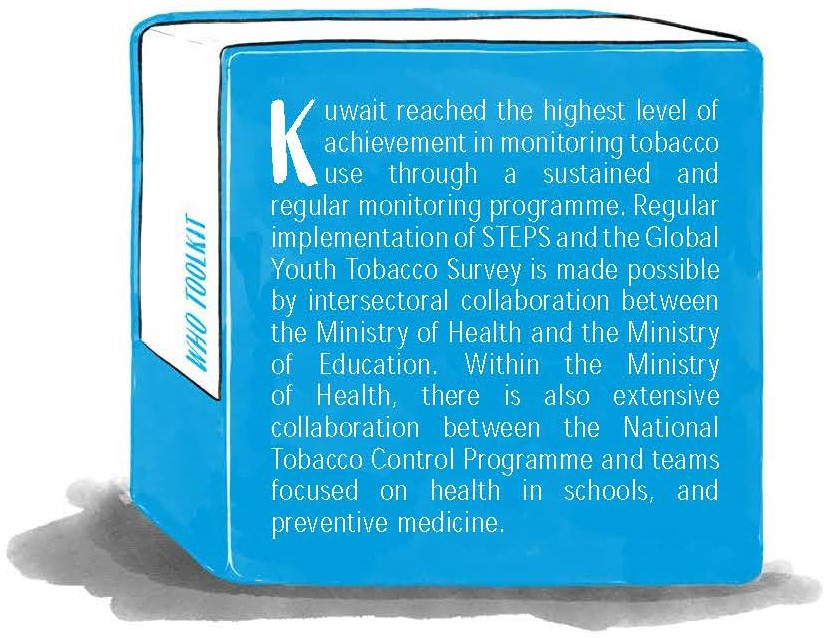World Health Organization. Regional Office for the Eastern Mediterranean
Improving service provision for people living with NCDs in occupied Palestinian territory: Lessons from the COVID-19 pandemic
04 Oct 2023
World Health Organization. Regional Office for the Eastern Mediterranean | 10 Sep 2023
Kuwait has made significant progress in addressing the root causes of noncommunicable diseases (NCDs), such as tobacco use and salt consumption, while taking innovative actions to increase access to mental health services. Multisectoral collaboration has been key to the country’s success and is the blueprint for future progress as Kuwait works to reduce NCDs before 2030.
 Kuwait recognized the impact of the pandemic on the population’s mental health, and the Ministry of Health offered support through helplines, online services and an app.
Kuwait recognized the impact of the pandemic on the population’s mental health, and the Ministry of Health offered support through helplines, online services and an app.
By integrating mental health into primary health care settings, Kuwait is simultaneously increasing mental health provision, creating cost-effective services, raising awareness and tackling stigma.
Since ratifying the WHO Framework Convention on Tobacco Control (WHO FCTC) in 2006, Kuwait has used multisectoral collaboration within government and international collaboration to reduce tobacco consumption both domestically and regionally.
Kuwait has pioneered tobacco cessation services as part of its tobacco control policy since the 1980s. This forward-thinking outlook helped shape tobacco control strategies during the pandemic, such as the ban on waterpipes.
Helping tobacco users to quit has been an essential part of Kuwait’s tobacco control policy since the Region’s first tobacco cessation clinic opened in Kuwait in the early 1980s. By 2003, there were cessation clinics in every governorate, providing medical assessment, nicotine replacement therapy and counselling.
Over the years, these clinics have come under scrutiny. In order to keep operating they have had to: present scientific evidence of the effectiveness of cessation clinics in tobacco control; train doctors, nurses and health inspectors to bring them up to international standards and update the protocol for managing nicotine addiction treatment.
Today, clinics are supervised by a national programme, staff have certified training, and the number of clinics is increasing, with some integrating into primary health care centres.
Kuwait’s role in advancing the Protocol to Eliminate Illicit Trade in Tobacco Products is to continue this innovative, science-led approach. Kuwait became a signatory to the Protocol in 2012 and hosted the first Gulf Cooperation Council Regional meeting on the subject in 2015.
The Ministry of Health collaborated with the Ministry of Finance, the Ministry of Commerce and Industry, customs authorities and the Ministry of Foreign Affairs to work through all the legal processes to ratify the Protocol in 2019.
In March 2020 when the pandemic hit, the country banned waterpipe use in public places. Kuwait used World No Tobacco Day as the fulcrum for an awareness campaign via mass and social media linking tobacco use and the transmission of COVID-19.
Future plans include:
High salt intake is a recognized risk factor for a range of NCDs. To mitigate this problem, the Kuwaiti Food and Nutrition Administration developed a salt reduction strategy in 2013. They worked with private companies to determine why and how to reduce sodium levels as part of a collaborative salt reduction plan. By the end of the year, the country’s main supplier of bread (Kuwait Flour Mills and Bakeries Company) had reduced salt levels by 20% in all but one of its breads.
Kuwait has been working on a programme to integrate mental health services into primary care by training family physicians to carry out primary, secondary and tertiary prevention for mental health issues.
Primary prevention aims to prevent mental health disorders before they occur, through reducing risk factors such as stress and increasing protective factors such as involving patients in community groups. Secondary prevention aims to detect existing mental health disorders and promptly intervene to ensure the disorder doesn’t worsen, for example, by screening patients for depression or suicide risk and intervening accordingly. Tertiary prevention aims to prevent mortality, relapses of illness and reduce disability. This is achieved through all forms of rehabilitation and reintegration.
Before this programme began in 2011, there were fewer than 84 psychiatrists in a country of 4.5 million people. Most people seeking psychiatric help presented to primary care, which was the stimulus for giving mental health training to primary care physicians. By 2019, the programme had: created 12 mental health clinics within primary care settings; trained over 200 physicians; implemented campaigns to raise public awareness of mental health conditions, while reducing the stigma associated with receiving care and increased the availability of antidepressant and antipsychotic medications in primary care centres.
The success of this programme and the raised profile of mental health helped to mitigate the psychological effects of the COVID-19 pandemic and related measures such as lockdowns. To ensure continuity of care, all outpatient psychiatric consultations and mental health clinics in primary care settings switched to offering online services from March 2020.
During lockdowns, health providers offered a range of services:
The Ministry of Health is looking to build on platforms like “Shlonik” to make mental health services more widely available in the future.
This country story is part of a series on sharing successful strategies from the Eastern Mediterranean Region mitigating noncommunicable diseases and mental health disorders during the COVID-19 pandemic and beyond. Discover additional stories and insights in the full report published by the World Health Organization Regional Office for the Eastern Mediterranean.